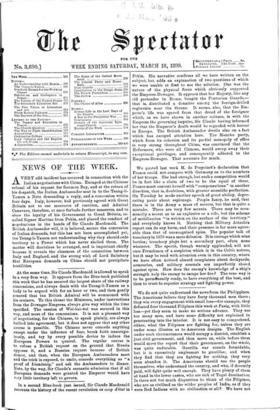We quoted last week M. de Freycinet's declaration that France
could not compete with Germany as to the numbers of her troops. She had enough, but such a competition would be in fact like a claim of two to be the equal of three. France must content herself with 'compensations" in another direction, that is, doubtless, with greater scientific perfection. On Tuesday he made another speech of great ability, depre- cating panic about espionage. People fancy, he said, that there is in the Army a mass of secrets, but that is quite a mistake. There are very few secrets. There may be occa- sionally a secret as to an explosive or a rifle, but the scheme of mobilisation "is written on the surface of the territory," and everybody knows it. Nothing that Military Attaches report can do any harm, and their presence is far more agree- able than that of unrecognised spies. The popular talk of treachery in 1870 was a mere delusion. It is courage which wins battles; treachery plays but a secondary part, often none whatever. The speech, though warmly applauded, will not cure Frenchmen of a suspicion which is in the Celtic nature, but it may be read with attention even in this country, where we have often noticed absurd complaints about dockyards, armouries, and military arsenals are imperfectly closed against spies. How does the enemy's knowledge of a ship's strength help the enemy to escape her fire ? The true way is to be permanently ready, to have everything of the best, and then to trust to superior strategy and fighting power.






































